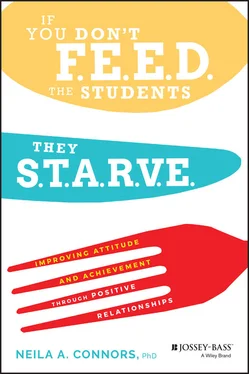Greet and treat others with dignity and respect . What does that really imply? Let's look at dignity first.
The dictionary definition of dignity reads, “The quality or state of being worthy of self-esteem and self-respect.” Dignity is one of those words like tolerance, love, and compassion that we all instinctively believe is necessary for success but we all have different interpretations of how to show it. If we asked 10 people to define dignity and give tangible activities that demonstrate it, we would have 10 different ideas and models. While dignity is difficult to delineate, we all can clearly articulate when we have NOT been treated with dignity. Dignity, in my opinion, means appreciating others as they are and treating them as THEY want to be treated.
“Even if the student's life away from school is bleak and miserable, she/he will work if what she/he finds in school is satisfying.”
William Glasser
Some suggestions for teachers to discuss about creating an atmosphere of dignity are:
1 Articulate and model a policy to prevent any form of prejudice, abuse, and bullying.
2 Emphasize dignity in every activity, ritual, and schoolwide event.
3 Treat every person that enters your building respectfully (ensure there is a process to know who is entering your building).
4 LISTEN to and support others, allowing everyone to express their opinions and beliefs in a safe and nurturing environment.
5 Provide techniques and solutions to identify those with low self-esteem issues and needing positive reinforcement.
6 Emphasize the self-worth of others by providing as many positive activities and choices as possible.
7 Provide a process for anyone feeling bullied or unsafe and communicate it to all.
8 Do whatever it takes to create a RESPECTFUL environment for all.
Now that we have defined dignity, what is respect? The dictionary reads, “To feel or show deferential regard for, esteem, to avoid violation of or interference with, a feeling of appreciation, the state of being regarded with honor or esteem.” Again, we could ask the same 10 people to define respect and give specific examples of respectful schools. To have fabulous communication, we must have respect . We must be cognizant of culture to understand respect.
Respect is more easily demonstrated through actions, words, programs, rituals, policies, and activities. Respect covers a vast amount of components including:
Ourselves
Others (looks, actions, and personalities)
The environment
Physical space
Different viewpoints, philosophies, beliefs, and opinions
Religion
Diversity
Gender
Lifestyle choices
Ethnic origin
Physical and mental ability
FSSs recognize these components and have rich conversations about what happens in the building to provide respect to all.
My dear friend Gene Bedley, the executive director for the National Character Education Center, is the master of teaching respect. He has an entire program on ensuring your school teaches and models respect. Gene has eight rules of respect :
1 Everyone has dignity and worth. Human beings are valuable and unique. Each person is an unrepeatable miracle woven together like no other person.
2 Acknowledge and validate others' feelings and ideas. Kindness is the language the deaf can hear and the blind can see.
3 Focused eye contact and the ability to repeat what others share will demonstrate active listening. The first step to effective listening is to stop talking.
4 When exchanging ideas with another person, seek first to understand by asking clarifying questions.
5 Recognize that your body language communicates as much as your words. Your actions speak so loudly, people can't hear you.
6 Recognize that every person has something to teach. To teach is to learn; to listen is to learn more.
7 The way you treat others is proof of the respect you have for yourself.
8 Express generosity and kindness to those in need. Love never fails.
Gene's program recommends that schools begin a Respect Campaign focusing on “IT'S NOT COOL TO BE CRUEL.” He emphasizes to treat others with respect and encourages everyone to wear buttons that ask, “Do you know what I like about you?” to also spark intense discussions.
“What comes from a person when they are “squeezed” shows what's inside.”
Wayne Dyer
Realistically, we all know that dignity and respect begin at home. However, we cannot put our heads in the sand and ignore the fact that some students arrive at our doors with no understanding of what it means to promote dignity and respect. We must deal with this issue head on to create our FSS.
A perfect example of this was in my first year of teaching. I was from Massachusetts teaching in an extremely southern school, Lacoochee Elementary in Lacoochee, Florida. As a young, single teacher from the North, I was amazed at how the students would always respond, “yes ma'am” or “no ma'am” when asked a question. I “disrespectfully” asked them not to call me “ma'am” because I did NOT understand the culture and associated ma'am with age. Immediately, my wonderful principal called me into his office and politely, with dignity and respect, taught me that it was the southern culture to refer to adults as ma'am and sir. I learned a valuable lesson that day. I also personally learned to use the terms ma'am and sir with pride. Teachers must respect others' cultures and learn as much about the culture as possible.
I believe there is a hierarchy occurring when we concentrate initially on respect. Respectful adults then focus on relationships, which leads to relevance in the school and classroom. Creating an environment of care and compassion is based on relationships – all relationships. This is a school where a priority is placed on fostering meaningful student-to-student, student-to-adults, adults-to-students, and adult-to-adult relationships. This is a school where bullying, racial comments, and inappropriate behavior are absolutely unacceptable. This is an FSS where adults and students enjoy and look forward to long-term positive relationships.
Marzano states, “Positive relationships mean less work engaging students, easier classroom management, a longer focus time, and students willing to take risks.” Teachers must build these relationships through communication, seeing students as worthy and responsible, keeping commitments, being kind , clarifying expectations, and being loyal, fair, and consistent. Some simple ways to build relationships include:
1 Be waiting at your door when students arrive. You can assess any problems, the happy kids, and other emotions about to enter your classroom.
2 Be aware of who you call on throughout the lesson. Try to develop a culture where every student feels comfortable to share.
3 Respect, respect, respect – all students until they don't earn it. Then attempt to establish a one-on-one where the topic is discussed.
4 Make sure you work on consistency. Students pick up on inconsistencies immediately. In some schools, the only consistency is inconsistency.
5 Have a “bell ringer” or “do now” activity on the board that students must start on immediately upon entering the classroom. All of the teachers at MacIntryre Park Middle School (MPMS) practice this strategy and praise students who follow the instructions.
6 Teach students what your expectations are and what they look like. Go over them daily during the first month of school. And occasionally when a review is needed, start over again. Do NOT assume students know what you mean when you say, “Enter the room quietly.” To teach the student, you must reach the student.
Читать дальше












